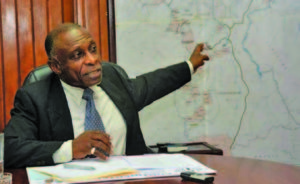In light of two instances on social media where the map of Guyana was depicted without its Essequibo region, the Foreign Affairs Ministry on Monday expressed “deep concern” and asserted that it was “looking into the matter”. The first instance of this image surfacing was on the Facebook page of the American Home and Beauty Centre – a local company – on May 24, 2018, as the business wished Guyanese a “Happy Independence Day” while advertising a “Sale”.

However, an ‘Essequibo-less map’ popped up on the website of the State-owned newspaper, the Guyana Chronicle on Independence morning. After the images went viral, the two entities posted apologies. The newspaper’s principal editor said that the matter was being investigated.
However, on Monday, the Foreign Affairs Ministry said that the shape of Guyana’s 83,000 square miles is unmistakable.
“From the dawn of our independence to this day, we have spared no effort to preserve our sovereignty and territorial integrity. This act which occurred on our 52nd Anniversary of Independence should serve as a sobering reminder that the threats to our territory remain real and dangerous,” the Ministry said in a statement issued.
The Foreign Affairs Ministry also said that it has not ruled out the strong possibility that these instances were a cyber-attack, and was looking into the matter.
Border controversy
In March, Foreign Affairs Minister Carl Greenidge filed the border controversy case at the International Court of Justice at the Hague asking the World Court to confirm the legal validity and binding effect of the 1899 Arbitral Award.
The court document notes that while Venezuela has never produced any evidence to justify its belated repudiation of the 1899 Award, the neighbouring country has used it as an excuse to occupy territory awarded to Guyana in 1899, to inhibit Guyana’s economic development, and to violate Guyana’s sovereignty and sovereign rights. In filing the application, Minister Greenidge, who will serve as Guyana’s agent in the proceedings before the ICJ, had said: “… Guyana has respected the Secretary General’s decision and placed its faith in the International Court of Justice to resolve the controversy in accordance with its Statue and jurisprudence, based on the fundamental principles of international law, including the sanctity of treaties, the maintenance of settled boundaries and respect for the sovereignty and territorial integrity of States”.
Venezuela had only changed its position formally in 1962 as the United Kingdom was making final preparations for British Guiana’s independence when the Spanish-speaking republic had threatened not to recognise the new State. Venezuela renewed its Essequibo claims after United States oil giant ExxonMobil had announced a major oil find off Guyana’s Stabroek Block in May 2015.



